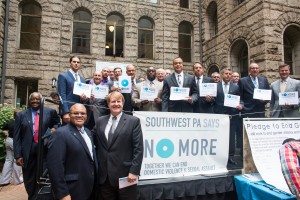Posted by
By Rabbi Aaron Bisno and Brian Schreiber on June 7, 2016
Let’s Continue the Movement of Men Stepping Up to Stop Gender Violence
For the third year in a row, we are joining with dozens of other regional leaders in signing the Father’s Day Pledge #FathersDayPledge #PAsaysNoMore
This vow to break the generational cycle of violence for children, teens and young adults calls on all of us to change public attitudes and social norms around gender and partner violence of any kind.
 We are both raising elementary-school-aged children and are committed to their inheriting a less violent, more compassionate society. Yet, the dating and domestic violence statistics are staggering. One in four girls is sexually abused in childhood*; one in five college-age women are sexually assaulted**; one in three women are victims of violence by an intimate partner***; and far too many children grow up in homes where fear and violence are the norm.
We are both raising elementary-school-aged children and are committed to their inheriting a less violent, more compassionate society. Yet, the dating and domestic violence statistics are staggering. One in four girls is sexually abused in childhood*; one in five college-age women are sexually assaulted**; one in three women are victims of violence by an intimate partner***; and far too many children grow up in homes where fear and violence are the norm.
Because 95% of the time, these violations of domestic tranquility (what Judaism calls shlome bayit) is initiated by men, it is no longer acceptable for women to be the only ones calling for change. The scourge of violence in intimate relationships must stop! As one of our colleagues recently put it, “Men’s behavior toward women is not a women’s issue, it’s a men’s issue.” Therefore, we believe it is time for all of us to raise our voices!
The Jewish community is not immune to the reality of violence within relationships. Partner and domestic violence knows no prejudice where religious, educational, economic, political or age differences are concerned. We can each personally attest to acts of intimidation and violence against the people we see and work with every day at our respective institutions; and there have been occasions where each of us has needed to take immediate action on behalf of others in confidential and proactive ways.
No longer can any of us fail to be concerned with the suffering of the injured, the denial of the perpetrator, or the silence of the bystander, to say nothing of the indifference with which this issue is often met in schools, on campuses, within our institutions and among ourselves when we gather as a community.
For us, the #FathersDayPledge and the #PASaysNoMore campaigns go beyond our own organizational priorities and religious values. Now it’s personal. We are each working on the state and local level on advocacy and education, with the objective to increase awareness and action in our own community; and we have begun to discuss these issues with our own children.
We do this out of the imperative steeped in Jewish tradition and social activism – Do not stand idle while your neighbor bleeds. (Leviticus 19:16). We will know we are making progress when we see more men joining women in this movement, when we see both men and boys intervening in situations when other males are acting abusively, and when we all talk to our sons, as well as our daughters, about the expectations we have for the kinds of relationships and behaviors they will share with partners and peers.
Our goal for today is simple. We ask both men and women to sign the pledge to end gender/domestic/intimate partner violence at www.SouthwestPASaysNoMore.org and take advantage of celebrating the role of positive fatherhood in our homes and in our communities.
Our hope for tomorrow is that everyone of us within this Jewish community becomes deeply engaged in the effort to eradicate gender-based violence in our relationships and homes, thereby creating positive behavior changes in keeping with the best of our values and our faith.
Rabbi Aaron Bisno is the senior rabbi at Rodef Shalom Congregation and serves on the board of the Pennsylvania Coalition Against Domestic Violence (PCADV).
Brian Schreiber is the CEO of the Jewish Community Center of Greater Pittsburgh and serves on the advisory board of Standing Firm: The Business Case to End Partner Violence.
Photo Credit: Renee Rosensteel
*Finkelhor, D., Hotaling, G., Lewis, I. A., & Smith, C. (1990). Sexual abuse in a national survey of adult men and women: Prevalence, characteristics and risk factors. Child Abuse & Neglect 14, 19-28. doi:10.1016/0145-2134(90)90077-7
**Krebs, C. P., Lindquist, C., Warner, T., Fisher, B., & Martin, S. (2007). The campus sexual assault (CSA) study: Final report. Retrieved from the National Criminal Justice Reference Service: http://www.ncjrs.gov/pdffiles1/nij/grants/221153.pdf
***National Coalition Against Domestic Violence, National Intimate Partner and Sexual Violence Survey 2010 Summary Report